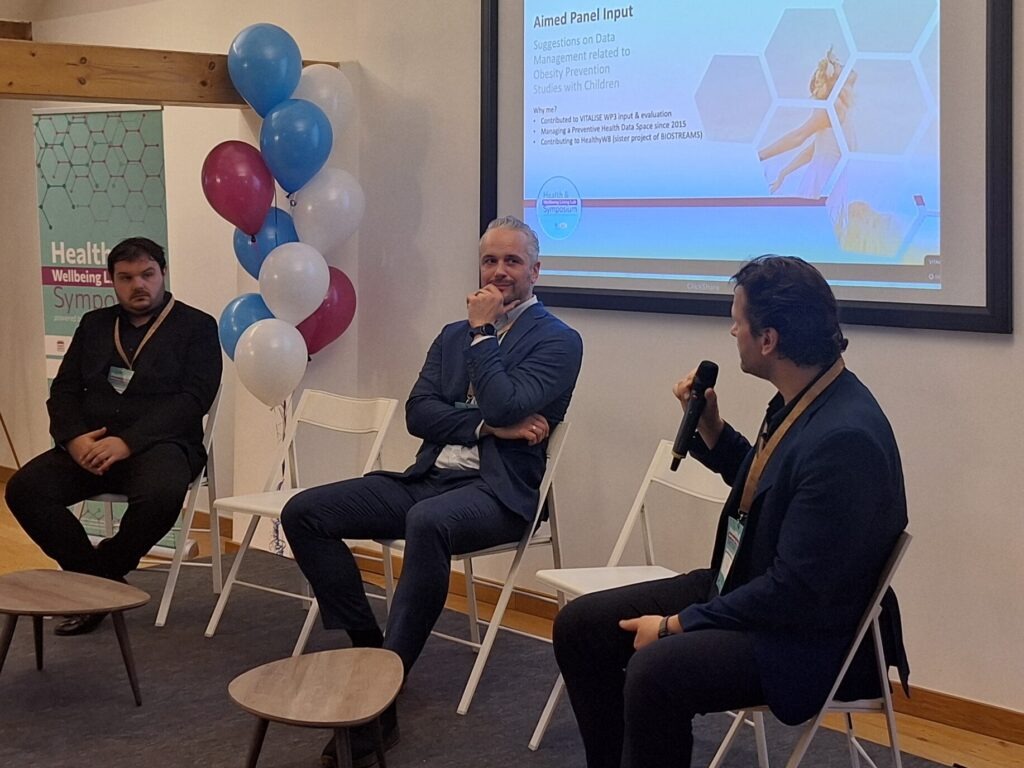In the heart of Brussels, amidst the bustling streets and historic landmarks, a gathering of minds took place that promised to shape the future of research infrastructure in the realm of health and wellbeing. BIO-STREAMS joined the Health and Wellbeing Living Lab symposium, “Living Labs as Research Infrastructures,” organised by VITALISE consortium together with ENoLL on February 20.
Representing BIO-STREAMS was Prof. Izidor Mlakar, from the University of Maribor, and Lars Munter, of the Komiteen for Sundhedsoplysning. Along with esteemed colleagues, the two participated in a panel discussion on Childhood and Adolescence Health in Living Labs.
Sister project, HealthyW8, was also presented within the panel, represented by Pieter Van Gorp of the University of Twente, Netherlands.
In collaboration with VITALISE project
The symposium served as a platform to spotlight the achievements of the VITALISE project, a collaborative endeavour spanning three years and funded by the European Union’s Horizon 2020 research and innovation programme. At its core, VITALISE seeks to harmonise the services and procedures of Health and Wellbeing Living Labs across Europe and beyond, with the aim of transforming them into open and accessible research infrastructures.
VITALISE has been instrumental in demonstrating the significance of Living Labs as integral components of the research ecosystem. By aligning with the overarching vision of Living Labs developed over the last 15 years, the project has produced tangible results that advance the recognition and quality of harmonised Living Labs.
BIO-STREAMS’ involvement

BIO-STREAMS is propelled by a set of scientific objectives that underscore its commitment to advancing obesity research and management. Central to our mission is the creation and deployment of the BIO-STREAMS Obesity Biobank, a repository hosting real datasets from diverse geographical locations. This biobank not only provides open access to authentic data but also offers synthetic datasets, fostering standardised data collection and analysis methodologies.
Complementing this effort is the development of the BIO-STREAMS Obesity Platform, a cloud-based framework designed to support the biobank while hosting dedicated services and tools for knowledge sharing, risk assessment, and lifestyle recommendations.
At its core, BIO-STREAMS is driven by societal and business objectives aimed at fostering collaboration, accelerating knowledge transfer, and promoting the adoption of initiatives in relevant settings. By establishing a multidisciplinary network, BIO-STREAMS seeks to trigger policy changes, enhance health literacy, and bridge the gap between citizens and healthcare professionals. Furthermore, BIO-STREAMS is dedicated to showcasing its applicability, cost-effectiveness, and added value, laying the groundwork for a sustainable market entry strategy.
Read more: Bio-Streams: About the Project
BIO-STREAMS represents a transformative force in the fight against childhood obesity, guided by a holistic approach that encompasses scientific rigor, technological innovation, clinical implementation, and societal impact. As we embark on this journey, we remain steadfast in our commitment to shaping a healthier future for generations to come.
At the symposium, our colleagues had the privilege of engaging and collaborating with participants with a spirit of cooperation and knowledge sharing that defines the Living Lab community. As the symposium drew to a close, it left participants energised and inspired by the possibilities that lie ahead.
